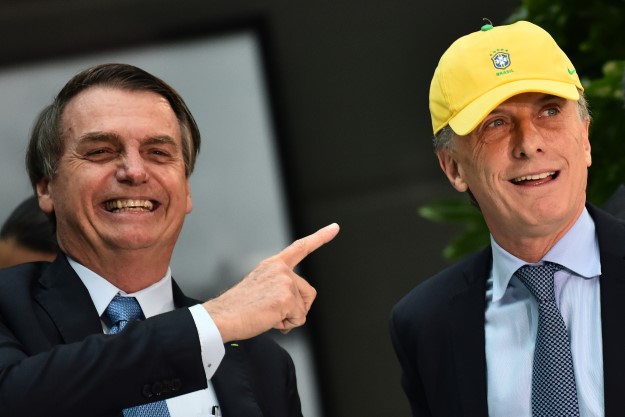When it comes to foreign policy, Brazil’s President Jair Bolsonaro and his closest advisors’ many controversial ideas, ranging from a fear of “globalism” and skepticism of multilateral institutions, such as the United Nations, to the conviction that climate change is little more than a Marxist plot, were already a cause of apprehension for many regional diplomats. And the sheer venting of the possibility of Brazilian support for a U.S. military intervention in Venezuela set off alarm bells in foreign ministries across the region.
Yet what most worries South American diplomats lately are not Bolsonaro’s ideas per se, but the fact that Brazilian foreign policy — and presidential diplomacy in particular — has become largely unpredictable. There is a growing consensus from Santiago to Bogotá that decisions in Brasília are the product of internal power struggles rather than strategic calculus — a worrisome situation for neighbors, considering that Brazil’s active participation is crucial to advance any kind of regional initiative.
Close to celebrating six months in office, the Brazilian government has no clear policy vis-à-vis Mercosur, a Uruguayan policy maker privately complained — except for occasional hints by Guedes and others that they were unhappy with the status quo. Bolsonaro’s recent visit to Buenos Aires seemed to sum up the lack of coherence that has become the defining element of Brazil’s international engagement since January. The visit happened after a series of snubs against Argentina, unprecedented since Brazil democratized in the 1980s: Bolsonaro’s first international visit was to Santiago, not Buenos Aires, as Brazilian diplomatic tradition had it.
Yet when he finally visited Argentina, the mercurial president suddenly expressed his excitement about the idea of a joint currency between the two countries, a project that would, in the most optimistic scenario, take several decades to implement and require an extreme commitment to regional integration. Without blinking an eye, Bolsonaro seemed to support European Union-style integration, a project that runs counter to everything his closest anti-globalist advisors believe about the need to preserve Brazil’s sovereignty and autonomy. Only weeks before, Brazil’s conspiracy-peddling Foreign Minister Ernesto Araújo had publicly said he was rooting for Brexit and right-wing nationalist candidates in the elections for EU parliament.
“It’s difficult to take all this very seriously,” an Argentine political scientist told me as Bolsonaro was boarding the plane back to Brasília.
Smaller countries, such as Uruguay, are at a loss at what appears increasingly apparent: Bolsonaro and Araújo lack any kind of coherent vision of what they’d like the region to look like – beyond their stated desire that right-wing governments should win elections across the region. But by repeatedly warning Argentines about the return of former President Cristina Kirchner’s movement in October’s presidential election, Bolsonaro committed a rookie mistake: Not only was his rhetoric unhelpful for President Mauricio Macri – whose reelection ambitions hinge on his ability to attract the moderate voters who find Bolsonaro unappealing – but it may create a problem for Brazil if kirchnerismo does in fact return, negatively affecting the most important bilateral relationship in South America. As long as the interest in regional integration depends on temporary ideological alignments, there is little hope for a constructive long-term debate about the future of the region.
Another last-minute policy reversal a week before had caught even insiders off guard. Bolsonaro formally recognized Venezuelan opposition envoy María Belandria as Venezuela’s Ambassador to Brazil after declining to do so days earlier. The decision was a blow to his government’s military faction, which had convinced the president to refrain from it. Bolsonaro’s military advisors had argued that formally recognizing Belandria was an unnecessary provocation that could thwart the government’s attempts to normalize affairs along the Venezuelan border, which had just reopened after being closed for months. The abrupt shift in policy deepened concerns by governments in the region regarding the predictability of Bolsonaro’s foreign policy — and that how, a European diplomat euphemistically commented, Bolsonaro was a “difficult partner.”
Brazil’s stagnant economy and political instability will further increase the likelihood that 2019 will be a lost year for the country’s foreign policy, as it reduces the government’s capacity to articulate and implement a cohesive international project. A look at Brazilian foreign policy since democratization suggests that activism abroad is only possible if things are in order domestically — as was the case (with a few hiccups) between 1995 and 2013. Only when hyperinflation was vanquished did President Fernando Henrique Cardoso have the time and credibility to design an international strategy, and Brazil remained a key player for nearly two decades. Yet since the 2013 street protests, no Brazilian president has enjoyed the tranquility and approval ratings necessary at home to have an impact abroad, with effects keenly felt throughout the neighborhood.
A lot suggests that Bolsonaro in 2019 — and possibly beyond — will be too busy dealing with domestic challenges to embrace foreign policy activism. In this sense, Brazilian politics is different from U.S. politics, where unpopular presidents at times increase their foreign policy activism since it is the only area where they can operate freely. Brazilian foreign policy, by contrast, is only meaningful if presidents are popular at home, something that does not seem to be in the cards for Bolsonaro. The consequences are severe. An inward-looking Brazil is set to dramatically limit South America’s capacity to articulate and implement a clear strategy to address its many common challenges and jointly tackle an ever more unpredictable global political scenario.








